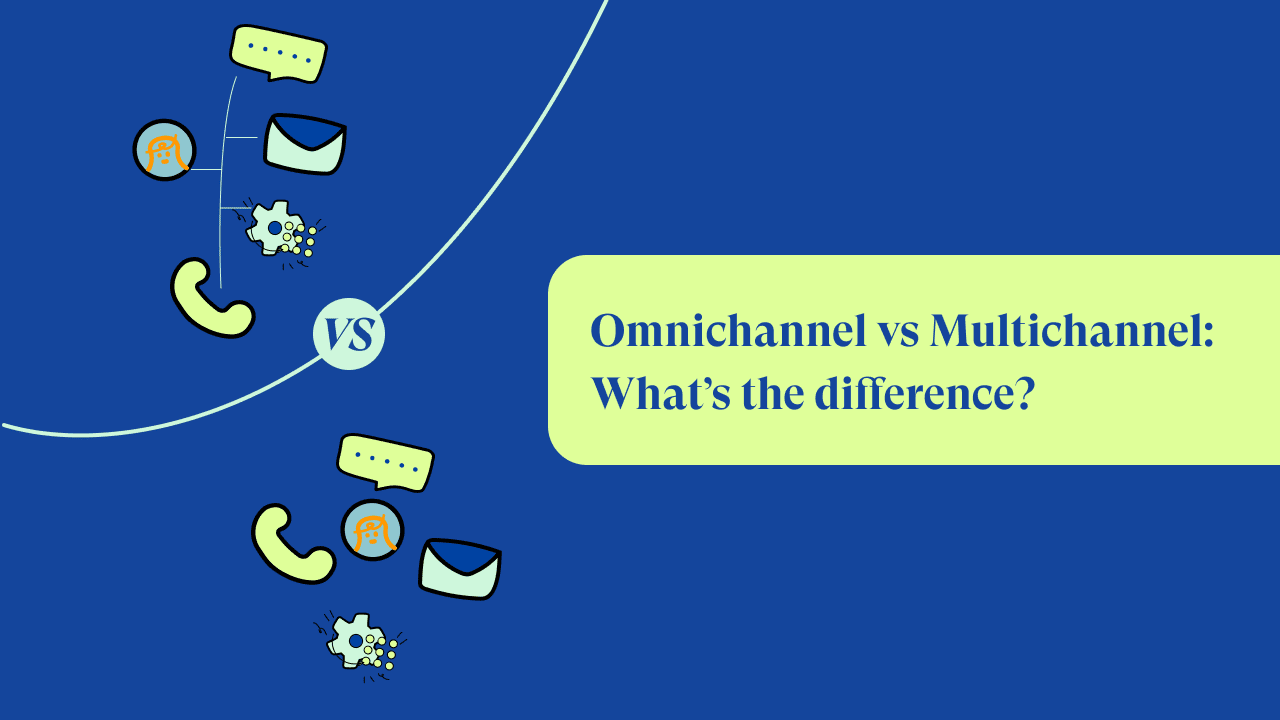‘Omnichannel’ and ‘multichannel’ are more than just fancy words – they’re powerful approaches that can help businesses to take their marketing strategies to the next level.
In this article, we’ll be exploring the differences between Omnichannel and Multichannel and their appropriate use cases.
What is Multichannel?
Multichannel is an ecommerce strategy that sells only on preferred channels, offering a separate buying opportunity to customers. It’s a flexible and versatile approach that allows consumers to choose their preferred channel.
It’s flexible, but we expect brands to act within their channels. This strategy works for businesses because analyzing which channel their audiences favour help them maximize their efforts for that channel and grow their sales and ROI.
The focal point of this approach is that it is brand-centric, wherein channels operate independently.
Definition of Omnichannel
Omnichannel is an e-commerce sales strategy that is more customer-centric. It is adopted by sellers who want to sell across all channels and deliver a seamless shopping experience to consumers anytime and anywhere.
An omnichannel marketing approach is done through the computer, store sales, or mobile apps.
The omnichannel approach does not consider channels or platforms to be considered individual silos; instead, it creates an integrated selling approach across all channels delivering customer experience.
There are no boundaries considered between mobile selling, social media selling, or instant messaging selling techniques.
This unified approach displays personalized offers and products to the consumer and brings together various selling strategies, like websites, advertising, physical advertising, social media marketing, email marketing, etc.
Are Omnichannel and Multichannel Similar?
Both omnichannel vs multichannel e-commerce strategies are used by businesses to sell, with the only difference being that the use of omnichannel strategy implies a more customer-centric approach, whereas a multichannel approach implies a more brand-centric approach.
With an omnichannel approach, consumers have the access to products and services on all platforms, whereas, in a multichannel approach, the availability of products and sale-conversion strategies are independently handled on multiple channels.
Business Example – Let us consider Apple’s multi-channel business approach and Amazon’s omnichannel selling approach, which pertain to omnichannel vs multichannel ecommerce.
Both brands are successful in their respective regime and have associated with the strategy according to their product line and customer demand.
So, in this multi channel vs omni channel debate, businesses need to make the right choice depending on their business needs.
How to Develop a Successful Omni/Multi-Channel Marketing Strategy
When deciding on how to develop a successful multi channel vs omni channel marketing strategy, where both complement each other, consider the following points:
Step 1: Define The Problem before Starting on a Solution
Before you can develop an effective strategy, you need to know what exactly it is that your business needs and how far away that goal is.
For example, if your current customers only spend $10/month on average, but some of them would be willing to pay $50/month for additional services or products, then focus on developing relationships with those people and reaching more potential customers.
Step 2: Goal Setting
Setting goals before undertaking digital marketing initiatives ensures that they’re aligned with your company’s omnichannel strategy objectives, making them more likely to succeed in achieving their intended outcomes.
Step 3: Planning And Budgeting
While you don’t have all the access to information about intricate expenditure plans or budgets, all that matters is whether or not your financial goals are achievable within a reasonable timeframe (usually 3-6 months).
Key Differences between Omnichannel & Multichannel Approaches
Understanding the difference between multichannel and omnichannel is crucial when you’re deciding which one works better for you.
If you’re wondering which channel is best for your business, there are a few factors to consider:
- Which channel is best for your customers?
- Which channel is best for your budget?
- Which channel is best for your team?
- Which channel(s) are most aligned with the brand you want to project?
Multichannel marketing has certain advantages over more traditional omnichannel approaches.
This is mostly because multichannel can be more cost-effective. After all, it leverages existing channels rather than having different teams dedicated to each one.
It also allows companies access through multiple touchpoints and thus greater control over their message delivery paths by choosing which type of communication will work best in each instance – email vs text messaging, social media vs radio ads, etc.
These channels are used to reach their target audience where they are spending time online rather than trying something new every time just because it might work better elsewhere.
How We Can Choose Channels Based on Business Model
Multichannel can also mean having an online presence alongside brick-and-mortar retail locations, an approach referred to as “omnichannel.”
Multichannel is a more commonly used term for how an organization reaches out directly to potential consumers via multiple channels at once (e.g., email marketing) rather than just one channel, like advertising on television or radio only.
Omnichannel is an umbrella term for any multichannel strategy. However, in practice, it’s more often used to describe the omnichannel vs multichannel customer service experience after a customer has made a purchase and received their product or service.
For example, if we go back to the original scenario where the customer bought running shoes online and realized they needed extra support socks, they might go order those products through an omnichannel process.
So, what does all this mean? When you think about a “multichannel strategy,” one of the large things to consider is how your organization can make use of different communication channels (like email marketing) to get in touch with consumers.
Start your 14 day Free Trial Engage in Customer Conversations Across Multiple Channels
Omnichannel vs Multichannel Examples
Omnichannel is the extension of the idea of omnichannel.
As customers move from channel to channel in their journey with you – whether it’s browsing a website or mobile app, etc., you want them to have a consistent omnichannel vs multichannel customer service experience across all these touchpoints so that they feel like they’re never leaving home (even if they aren’t).
Omnichannel is a customer experience goal, and it’s also a part of the broader digital transformation trend.
As customers’ expectations increase, so does their ability to find better experiences elsewhere. If you want to retain them, you need to provide them with an exceptional omnichannel experience from start to finish.
Is Cross Channel Strategy Better than Omnichannel & Multichannel Strategy?
While considering which amongst the omnichannel vs multichannel vs cross channel to go for a cross-channel strategy is the best option. Here are some reasons why:
- You Can Reach Your Target Audience More Effectively
With Omni/multi-channel strategies, there are so many different channels that it’s hard to know which one will be most effective at reaching your target audience.
With cross-channel strategies, you’ll have a better idea of where to focus your time and effort because you’re only using one or two channels rather than six, seven, or eight!
- It’s Easier to Get Sales with Multi-Channel Strategies
This is mostly because they’re available 24/7. Multi-channel strategies give consumers convenience by being available when people want them.
However, you must remember that not everyone always checks their social media feed or reads emails during business hours. Some prefer shopping at night after work ends, for example.
Fewer options make it easier for those who want answers right away without waiting until the next day.
Conclusion
So, what’s the verdict? In the omnichannel vs multichannel support debate, which is the better option for your business? Ultimately it comes down to what works best with your brand identity and goals.
The truth is both approaches can be beneficial. It all depends on your situation. If you have a physical location where you want to reach customers in person and over the phone, then omnichannel may be right for you.
However, if omnichannel feels too restrictive for your business – perhaps because it limits access to customer data across channels – then multichannel might be more suitable as an alternative approach.












